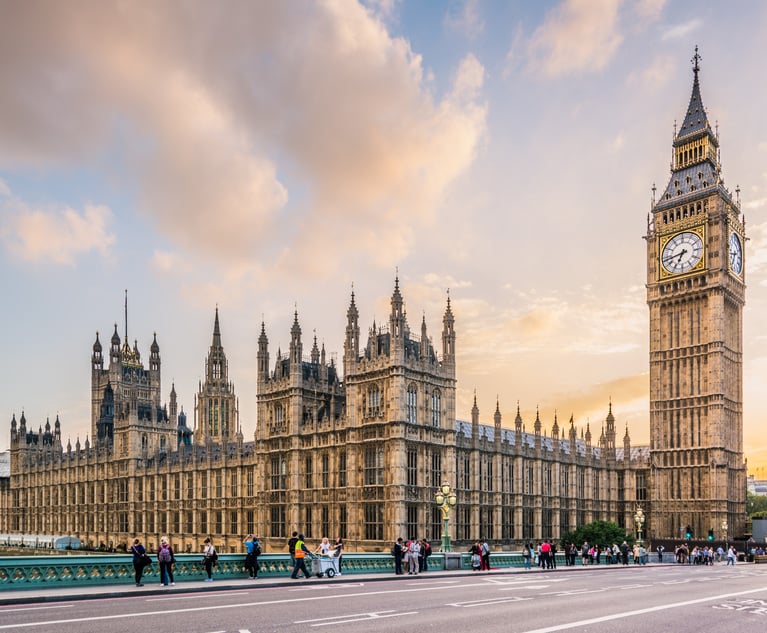Did Dominic Cummings Break The Law? Barristers Speak Out
Several lawyers have weighed in on the debate about whether the UK Prime Minister's senior adviser acted legally when he travelled to Durham during lockdown.
May 26, 2020 at 06:54 AM
5 minute read
 Dominic Cummings. Photo: Simon Dawson/Bloomberg
Dominic Cummings. Photo: Simon Dawson/Bloomberg
Barristers have taken to social media and the national newspapers to offer their views on whether the U.K. Prime Minister's most senior adviser, Dominic Cummings, broke lockdown rules by travelling to Durham with his family while his wife had COVID-19.
In a press conference on Monday, Cummings said that he had driven his wife and young son from London to County Durham on the evening of March 27 in order to stay at a cottage on his parents' farm, with the reasoning that his parents could look after his son should he also fall ill.
He also said that he had driven 30 minutes from the family's farm to the town of Barnard Castle on Easter Sunday, 15 days after he had first displayed symptoms, in order to test his eyesight and his fitness to drive. He said that he believed he behaved "reasonably" and did not regret his actions.
Despite calls for Cummings to resign, the Prime Minister is standing by his adviser, arguing that he at all times acted "reasonably". However, the question as to whether he acted legally has divided opinion among lawyers.
George Peretz QC of Monckton Chambers tweeted: "Cummings' *view* that he had acted reasonably and so hadn't broken the rules doesn't matter much. So — without in any way questioning his honesty here — his assurance that he didn't break them is not worth the paper it's written on."
In a blog post published on the Doughty Street Chambers website, Kirsty Brimelow QC said it was "completely clear" that Cummings breached government guidance on leaving his home.
"It is wrong in law for the Prime Minister to suggest that acting on instinct equates to lawfulness; in the same way that any excuse (that is not "reasonable") does not suffice," she wrote. "Obviously, reaching for 'instinct' also was contrary to all guidance at the time which was directing people to suppress their instincts to travel and to go to family.
"Whilst the strategy of attempting to argue that Mr. Cummings' conduct was within government guidelines is insulting and distressing to those who have made terrible sacrifices by staying indoors away from family, it also clears the 'we're all in this together' smokescreen to reveal a political plane where different rules apply."
However, not all share this opinion. One barrister suggests the regulations provide that one can leave their house where there was a "reasonable excuse" to do so, indicating that whether it is reasonable or not falls to a judge, and not to Parliament.
Writing in the Spectator on Sunday, Radcliffe Chambers barrister Steven Barrett said: "Ultimately, if pursued, the question [as to whether Cummings broke the law] would be one for a judge.
"I would be very surprised if a judge concluded that two parents leaving their home with a vulnerable young child, in order to guarantee childcare in the foreseeable likelihood of both parents being ill with the virus (which went on to hospitalise the boss of the man in question) acted unreasonably."
However, Brimelow QC counters this by suggesting that the justifications offered by government so far do not fulfil the 'reasonable' requirement. She says a claim by Transport Secretary Grant Shapps that it "is up to individuals to make their own decisions" runs "contrary to the law and to all guidance".
She argues that, whether there is a reasonable excuse "is an objective test; to be decided by the court".
Cummings is not the only party to the scandal. The country's Attorney General is also facing calls to resign after she voiced her support for Cummings. On Saturday, Suella Braverman took to Twitter to defend the adviser, saying: "Protecting one's family is what any good parent does. The @10DowningStreet statement clarifies the situation and it is wholly inappropriate to politicise it."
In response, Gerard McDermott QC of Outer Temple Chambers tweeted: "As nominal leader of the Bar and as [Attorney General], it might have been better to not express an opinion on this?"
Essex Court Chambers' Jeffrey Gruder QC is similarly dubious, tweeting: "Suella Braverman, as Attorney General and principal law officer what investigations did you conduct as to the reasons for Cummings journey to Durham before you accepted No 10's statement that the motive was childcare."
The U.K. government imposed a lockdown on March 23 when the Prime Minister asked the British public to stay at home to stop the spread of the coronavirus. It had been widely reported that Cummings was one of the main architects of the lockdown rules.
On May 10, restrictions in England were eased slightly.
Read more
Lord Sumption: A Response To My Critics On Lockdown
Brazil Supreme Court President in Hospital with Possible COVID-19 Infection
This content has been archived. It is available through our partners, LexisNexis® and Bloomberg Law.
To view this content, please continue to their sites.
Not a Lexis Subscriber?
Subscribe Now
Not a Bloomberg Law Subscriber?
Subscribe Now
NOT FOR REPRINT
© 2025 ALM Global, LLC, All Rights Reserved. Request academic re-use from www.copyright.com. All other uses, submit a request to [email protected]. For more information visit Asset & Logo Licensing.
You Might Like
View All
Malaysia’s Shearn Delamore Set To Expand Local Footprint With New Office Launch


CMA Uses New Competition Powers to Investigate Google Over Search Advertising

‘A Slave Drivers' Contract’: Evri Legal Director Grilled by MPs
Trending Stories
- 1Supreme Court Appears Sympathetic to Law Requiring Porn Sites to Verify Users' Age
- 2Cybersecurity Breaches, Cyberbullying, and Ways to Help Protect Clients From Both
- 3AI in 2025: Five Key Predictions on How It Will Reshape International Law Firms
- 4Justice Known for Asking 'Tough Questions' Resolves to Improve Civility
- 5Robinson & Cole Elects New Partners and Counsel
Who Got The Work
J. Brugh Lower of Gibbons has entered an appearance for industrial equipment supplier Devco Corporation in a pending trademark infringement lawsuit. The suit, accusing the defendant of selling knock-off Graco products, was filed Dec. 18 in New Jersey District Court by Rivkin Radler on behalf of Graco Inc. and Graco Minnesota. The case, assigned to U.S. District Judge Zahid N. Quraishi, is 3:24-cv-11294, Graco Inc. et al v. Devco Corporation.
Who Got The Work
Rebecca Maller-Stein and Kent A. Yalowitz of Arnold & Porter Kaye Scholer have entered their appearances for Hanaco Venture Capital and its executives, Lior Prosor and David Frankel, in a pending securities lawsuit. The action, filed on Dec. 24 in New York Southern District Court by Zell, Aron & Co. on behalf of Goldeneye Advisors, accuses the defendants of negligently and fraudulently managing the plaintiff's $1 million investment. The case, assigned to U.S. District Judge Vernon S. Broderick, is 1:24-cv-09918, Goldeneye Advisors, LLC v. Hanaco Venture Capital, Ltd. et al.
Who Got The Work
Attorneys from A&O Shearman has stepped in as defense counsel for Toronto-Dominion Bank and other defendants in a pending securities class action. The suit, filed Dec. 11 in New York Southern District Court by Bleichmar Fonti & Auld, accuses the defendants of concealing the bank's 'pervasive' deficiencies in regards to its compliance with the Bank Secrecy Act and the quality of its anti-money laundering controls. The case, assigned to U.S. District Judge Arun Subramanian, is 1:24-cv-09445, Gonzalez v. The Toronto-Dominion Bank et al.
Who Got The Work
Crown Castle International, a Pennsylvania company providing shared communications infrastructure, has turned to Luke D. Wolf of Gordon Rees Scully Mansukhani to fend off a pending breach-of-contract lawsuit. The court action, filed Nov. 25 in Michigan Eastern District Court by Hooper Hathaway PC on behalf of The Town Residences LLC, accuses Crown Castle of failing to transfer approximately $30,000 in utility payments from T-Mobile in breach of a roof-top lease and assignment agreement. The case, assigned to U.S. District Judge Susan K. Declercq, is 2:24-cv-13131, The Town Residences LLC v. T-Mobile US, Inc. et al.
Who Got The Work
Wilfred P. Coronato and Daniel M. Schwartz of McCarter & English have stepped in as defense counsel to Electrolux Home Products Inc. in a pending product liability lawsuit. The court action, filed Nov. 26 in New York Eastern District Court by Poulos Lopiccolo PC and Nagel Rice LLP on behalf of David Stern, alleges that the defendant's refrigerators’ drawers and shelving repeatedly break and fall apart within months after purchase. The case, assigned to U.S. District Judge Joan M. Azrack, is 2:24-cv-08204, Stern v. Electrolux Home Products, Inc.
Featured Firms
Law Offices of Gary Martin Hays & Associates, P.C.
(470) 294-1674
Law Offices of Mark E. Salomone
(857) 444-6468
Smith & Hassler
(713) 739-1250








